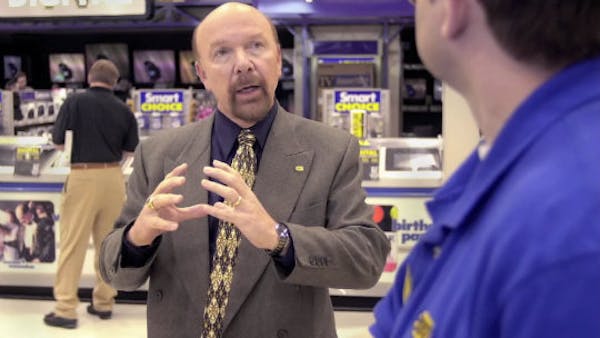As a free-wheeling entrepreneur who would transform Best Buy Co. into a $50 billion operation, Richard Schulze was a man not used to answering to someone else.
So when the 71-year-old business legend learned that the company's CEO and protégé, Brian Dunn, may have engaged in an inappropriate relationship with an employee, Schulze did what he would normally do when he was CEO -- he took matters into his own hands.
Schulze confronted Dunn but didn't consult his board of directors. Those who followed the case say Schulze forgot a simple mantra of corporate standards: As chairman of the board of directors, he could no longer act alone.
"Once a CEO, always a CEO," said Paul Hodgson, a senior research associate at GMI Ratings, which critiques corporate management, boards and executive compensation. Schulze's "responsibility was to the board, not to the management. A truly independent chairman would have, no question, taken that information to the board."
On Monday, the Richfield-based company said Schulze will step down as chairman at the annual meeting next month. He will leave the board in June 2013.
Schulze could not be reached for comment Monday. But in a company statement, he said he found Dunn's alleged conduct "totally unacceptable and contrary to Best Buy's policies and everything I and the company stand for."
The news comes as Best Buy struggles to reinvent itself in a challenging competitive climate amid changing consumer habits. Yet near-misses and reinvention at Best Buy -- born literally from the detritus of a tornado -- are part of the lore attached to the man and his company.
Schulze's legacy began just as the baby boom generation was gaining steam in 1966. Schulze took out a second mortgage on his young family's home and opened a retail audio store called Sound of Music in St. Paul's Macalester-Groveland neighborhood. The St. Paul native knew a bit about the business -- his father, Warren, ran an electronics distribution company.
Forgoing college, Schulze plunged head-long into the fledgling business. Sound of Music survived a cut-throat competitive landscape in the 1970s. But in 1981, the business was nearly wiped out when a tornado tore through the company's Roseville store, then its largest and most profitable. As business lore has it, wayward televisions and stereos were plucked from the ruins and sold at cut-rate prices. Consumers loved the heavily marketed discount concept, and Best Buy was born.
As the company honed the "big-box" retail format throughout the 1980s and 1990s, it was Schulze who ran the show. Relentlessly driven and ambitious, Schulze constantly challenged his team to think big and execute. "Dick had the best traits of an entrepreneur," said former Best Buy CEO Brad Anderson. "He was always shooting for big objectives. He had vision, imagination, and compelling drive. Dick would always assume it could be done. And sometimes, he already assumed it had been done."
Whether Best Buy can move beyond the Dunn controversy will effectively answer the question: Did Schulze wait too long to step aside?
"If Best Buy is unable to retain its dominant share in the marketplace, maybe yes," said Christopher Puto, dean of the Opus College of Business at the University of St. Thomas, where Schulze donated $50 million to help create a school of entrepreneurship.
Puto said Schulze "ranks among the highest in terms of personal integrity and values. It's unfortunate that this happened ... but it will not diminish his legacy."
It's not unheard-of for an entrepreneur to remain at the company he founded, even after it experiences tremendous growth or goes public, said John Stavig, professional director of the Gary S. Holmes Center for Entrepreneurship at the University of Minnesota's Carlson School of Management. Microsoft's Bill Gates and Starbucks' Howard Schultz serve as examples.
But some leaders find it difficult to channel their entrepreneurial energy into an established corporate culture.
"The skills set needed to start a business is very different from managing a large public company," said Stavig. "For virtually any entrepreneur, the business is like one of their own children."
After relinquishing the CEO post in 2002, Schulze -- by then a billionaire several times over -- distinguished himself through philanthropy.
He founded the Richard M. Schulze Family Foundation as a way of giving back to the community. In 2011, the foundation granted about $15 million to more than a dozen organizations.
Staff writer Thomas Lee contributed to this report. Janet Moore • 612-673-7752 Neal St. Anthony • 612-673-7144
